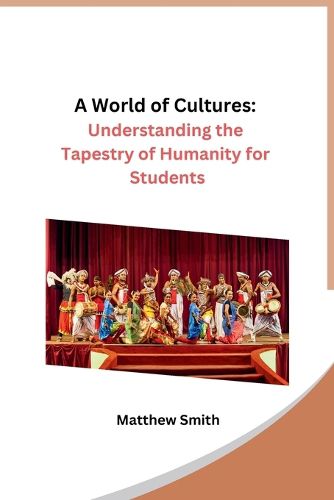A World of Cultures: Understanding the Tapestry of Humanity for Students
Matthew Smith

A World of Cultures: Understanding the Tapestry of Humanity for Students
Matthew Smith
This title is printed to order. This book may have been self-published. If so, we cannot guarantee the quality of the content. In the main most books will have gone through the editing process however some may not. We therefore suggest that you be aware of this before ordering this book. If in doubt check either the author or publisher’s details as we are unable to accept any returns unless they are faulty. Please contact us if you have any questions.
Cultural anthropology is a fascinating field of study that explores the diversity and complexity of human cultures across the globe. It is a branch of anthropology that focuses on understanding the beliefs, practices, customs, and behaviors of different societies. In this subchapter, we will delve into the fundamental concepts and methods of cultural anthropology, providing students with a comprehensive overview of this captivating discipline.
At its core, cultural anthropology seeks to answer the question: what does it mean to be human? By examining various cultural groups, anthropologists aim to understand the similarities and differences that exist among different societies and how these shape human experiences. Cultural anthropologists believe that culture is a vital part of human existence, influencing our thoughts, actions, and worldview.
One of the key concepts in cultural anthropology is cultural relativism, which emphasizes the importance of understanding other cultures from their own perspective. It encourages students to suspend judgment and avoid imposing their own beliefs and values onto others. By adopting a culturally relative stance, students can gain a deeper appreciation for the incredible diversity of human experiences and challenge their own assumptions.
Anthropologists employ a range of research methods to study culture, including participant observation, interviews, and surveys. They immerse themselves in the daily lives of the communities they study, observing and interacting with the individuals and documenting their rituals, traditions, and social structures. This fieldwork allows anthropologists to gain firsthand insights into the complexities of different cultures and helps them develop a more holistic understanding.
Moreover, cultural anthropology addresses various themes, such as kinship and family structures, religion and spirituality, language and communication, political systems, economics, and social organization. Exploring these topics provides invaluable insights into the ways in which different societies function and how individuals navigate their social worlds.
As students of anthropology, it is important to recognize the significance of cultural diversity and the impact it has on our global society. By studying cultural anthropology, students will be equipped with the knowledge and skills to engage with and appreciate the complexities of human cultures. This understanding fosters empathy, tolerance, and respect for others, enabling students to be effective global citizens.
This item is not currently in-stock. It can be ordered online and is expected to ship in 7-14 days
Our stock data is updated periodically, and availability may change throughout the day for in-demand items. Please call the relevant shop for the most current stock information. Prices are subject to change without notice.
Sign in or become a Readings Member to add this title to a wishlist.


